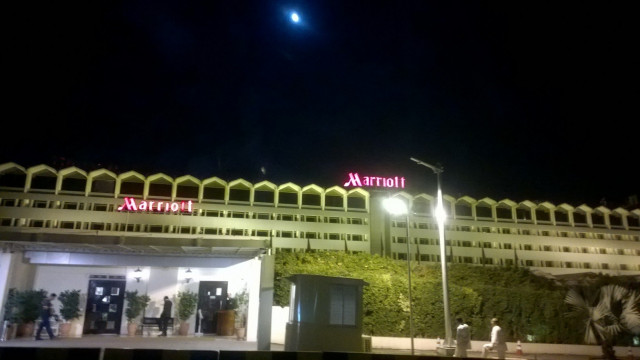SC wants barricades outside major hotels gone
Seeks compliance report on the action today, police told to set up checkpoints

Marriott Islamabad. PHOTO: EXPRESS
The order was passed by a three-member bench of the Supreme Court headed by Chief Justice Mian Saqib Nisar. The bench was hearing a petition filed by the Hashwani Hotel Limited against the Capital Development Authority (CDA).
The court had summoned the management of the Serena Hotel for Wednesday’s hearing.
Noting that barriers had been placed along Khayaban-e-Suhrawardy outside the hotel, the court maintained that no encroachment would be tolerated on a single inch of road.
Moreover, the bench asked why should the hotel on Agha Khan Road be given an exemption since they too had set up barricades outside the hotel.
Subsequently, the SC directed the CDA to remove all encroachments in front of these two hotels before evening and submit a compliance report on Thursday (today).
CPEC security: 20 hotels in Karachi to be monitored
At this, a representative of Serena Hotel asked CDA officials to point out blockages on the roads outside the hotel and that they will review their security measures.
The chief justice interjected and asked how will the hotel ‘review the situation’.
“It is impossible to travel in front of your hotel,” the chief justice bristled and directed CDA to remove all barricades by 2pm.
To ensure security for the hotel, the CJP instructed the Islamabad Police to set up temporary checkpoints on roads leading to the hotels but ensure that the traffic flow is not affected.
“Marriott Hotel has constructed structures even on spots which it was supposed to leave open,” Justice Nisar observed as he asked when and why roads in front of Serena Hotel were blocked.
Moreover, Chief Justice Nisar observed that roads from Zero Point to Aabpara had been closed because some notables had been living in the area and close roads whenever they wished.
Last week, the intersection in front of Parliament House at D-Chowk was opened to the public for the first time in over a decade following directives from Prime Minister Shahid Khaqan Abbasi. The 350 metre stretch of road had been closed to the public in November 2007 during the emergency proclaimed by the then president General (retd) Pervez Musharraf.
Before it was cordoned off, D-Chowk was used to access Parliament House, the Supreme Court and other parts of the Red Zone from Jinnah Avenue.
After its closure, residents have been forced to use the Aga Khan Road, Margalla Road, Khayaban-i-Suhrawardy and Shahrah-i-Jamhuriyat to reach the Red Zone.
Terror attacks ushered in roadblocks
Meanwhile, a CDA official, who spoke to The Express Tribune on the condition of anonymity, said that encroachment and illegal occupation of public property and even private lands are prevalent across the country.
Marriott signs deal to open Sheraton Grand Hotel in Lahore
While the capital had managed to maintain at least some semblance of discipline, it had to make way for a security argument in the wake of terrorist attacks on government, private and diplomatic installations.
Then, the diplomatic corps and the expatriate community, while justifiably concerned about their safety, built boundary walls and security fences including “dragon teeth” which extended to the footpaths apart from the roads.
The Interior Division obliged many foreign missions, agreeing to close many of the capital’s main avenues and streets to accommodate the wishes of foreign missions, he added.
A blast at the Marriot hotel in 2008 gave further rise to concerns of foreigners and sensitive installations in the city to barricade themselves, turning the capital into a virtual prison.
Published in The Express Tribune, March 15th, 2018.



















COMMENTS
Comments are moderated and generally will be posted if they are on-topic and not abusive.
For more information, please see our Comments FAQ